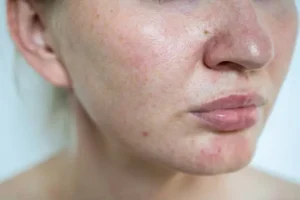Night skincare routine for glowing skin
Your skin works hardest overnight to repair and rejuvenate, which makes the nighttime the perfect opportunity to give your skin the extra care it deserves. An effective night skincare routine can enhance your skin’s health, encourage collagen production, and give you that coveted glow the next day.
Whether you’re aiming for bright, smooth, or hydrated skin, understanding the right steps to take in your nighttime regimen is crucial. Let’s dive into the essential steps for creating a night skincare routine that’ll leave your skin glowing.
Why is Night Skincare Important?
Before we begin with the routine itself, it’s important to understand why your skin needs extra attention at night.
- Repair Mode: While you sleep, your skin goes into repair mode, regenerating cells and regenerating collagen. This process is essential for long-term skin health, and having a good skincare routine before bedtime ensures that you’re giving your skin the right tools to work with.
- Boost Absorption: Your skin is more permeable at night, meaning it absorbs products more effectively, allowing you to get the most out of the treatments you apply.
- Rest & Recovery: A proper nighttime skincare routine can help with skin concerns like acne, fine lines, and dehydration, as the skin has the time to fully recover.
Steps for a Glowing Night Skincare Routine
Creating an effective night skincare routine involves several layers, each with a specific function. Below, we’ll break down each step and explain how you can incorporate it into your daily routine.
Double Cleansing (If Necessary)
Cleansing is the foundation of any skincare routine, and it’s even more crucial at night because your skin is exposed to pollution, dirt, sweat, and makeup throughout the day. Double cleansing is a technique that uses two cleansers to ensure the skin is thoroughly cleaned.
- First Cleanser (Oil-based): The first cleanser should be oil-based, as it will break down makeup, sunscreen, and oil-based impurities. Look for gentle cleansing oils or balms, which can dissolve makeup without stripping the skin.
- Second Cleanser (Water-based): After removing the surface impurities, use a water-based cleanser to remove dirt and sweat from the skin. Look for a gentle foaming or gel-based cleanser depending on your skin type (hydrating for dry skin or clarifying for oily skin).
Exfoliation (2-3 Times Per Week)
Exfoliating is essential for bright, glowing skin. It helps remove dead skin cells, unclog pores, and stimulate collagen production. However, be cautious—exfoliating too frequently can irritate the skin.
- Physical Exfoliators: Scrubs with small particles can be used for manual exfoliation, but these should be used gently to avoid damaging the skin.
- Chemical Exfoliators: Exfoliators with AHAs (Alpha Hydroxy Acids) or BHAs (Beta Hydroxy Acids) are gentler and more effective at resurfacing the skin. AHAs (like glycolic acid) work on the skin’s surface, while BHAs (like salicylic acid) penetrate deeper into pores. These acids also help boost skin radiance.
Toner (Hydrating and Balancing)
A toner is often overlooked in skincare routines, but it plays an important role in balancing the skin’s pH after cleansing and providing hydration. It also preps your skin for the following treatments.
- Hydrating Toners: These are essential for dry or sensitive skin. Look for toners that contain glycerin, aloe vera, or hyaluronic acid, which help replenish moisture.
- Exfoliating Toners: If you’re using a chemical exfoliator, consider using a toner with gentle exfoliating acids to keep your skin smooth. For those with oily or acne-prone skin, toners containing salicylic acid or witch hazel can be effective.
Serums (Targeted Treatment)
Serums are concentrated formulations that target specific skin concerns. The consistency of serums is typically lighter than moisturizers, allowing them to penetrate deeply into the skin for maximum efficacy.
- Vitamin C Serum: While often used in the morning, Vitamin C can be used at night to help brighten the skin, reduce dark spots, and boost collagen production.
- Hyaluronic Acid Serum: This hydrating serum is a favorite for dehydrated skin. It draws moisture into the skin and locks it in for a smooth, plump complexion.
- Retinol (Retinoid) Serum: Retinol is one of the most powerful ingredients for anti-aging and skin renewal. It helps with fine lines, wrinkles, and skin texture. However, retinol can cause irritation, so start slowly and apply it only a few times a week.
- Peptide Serums:Peptides are great for promoting collagen and elastin production, which are crucial for firm, youthful skin.
Eye Cream (For Dark Circles & Puffiness)

The skin around the eyes is delicate and thin, making it prone to dark circles, puffiness, and fine lines. A good eye cream can help target these concerns.
- Caffeine: Eye creams with caffeine help reduce puffiness and dark circles by constricting blood vessels and stimulating circulation.
- Hyaluronic Acid: This ingredient can also help plump up the skin around the eyes, reducing the appearance of fine lines.
Moisturizer (Sealing in Hydration)
A good moisturizer is essential to lock in the hydration and benefits of all the previous steps. It helps to repair the skin’s barrier and keep the skin feeling soft and nourished.
- Gel-based Moisturizers: Ideal for oily or acne-prone skin, these provide hydration without clogging pores.
- Cream-based Moisturizers: Richer creams are great for dry or mature skin as they provide intense hydration and nourishment.
Face Oil (Optional, for Extra Moisture)
If your skin needs an extra dose of moisture, adding a face oil after your moisturizer can help seal everything in and prevent moisture loss throughout the night. Look for nourishing oils like:
- Rosehip Oil: Known for its ability to improve skin texture and help with pigmentation.
- Argan Oil: A lightweight oil that provides hydration without clogging pores. Night skincare routine for glowing skin
Overnight Masks (Once or Twice a Week)
Overnight masks are an additional treat for your skin. They are designed to deeply hydrate and treat the skin while you sleep.
- Hydrating Masks: These are perfect for dry skin and are packed with ingredients like aloe vera, glycerin, and hyaluronic acid.
- Brightening Masks: Masks with Vitamin C or licorice extract can help fade dark spots and give your skin an even glow. Night skincare routine for glowing skin
Additional Tips for Glowing Skin:
- Stay Hydrated: Make sure to drink plenty of water throughout the day to keep your skin hydrated.
- Get Enough Sleep: Aim for 7-9 hours of sleep per night for optimal skin recovery.
- Healthy Diet: A balanced diet rich in vitamins, minerals, and antioxidants can help support your skin’s health from the inside out.
- Avoid Touching Your Face:Try to avoid touching your face frequently to prevent transferring dirt and bacteria onto your skin.
- Use Clean Bedding: Change your pillowcase regularly to avoid bacterial buildup, which can contribute to acne.
How often should I exfoliate at night?
Exfoliating at night is a great way to remove dead skin cells, promote cell turnover, and reveal a glowing complexion. However, how often you should exfoliate depends on your skin type, the exfoliant you’re using, and how sensitive your skin is.
General Guidelines:
Sensitive Skin:
- Frequency:1-2 times per week
- Why: Sensitive skin can be more prone to irritation, so it’s important not to over-exfoliate. Choose a gentle exfoliant, like a mild chemical exfoliator with lactic acid or a low-concentration AHA (Alpha Hydroxy Acid).
Dry Skin:
- Frequency: 1-3 times per week
- Why: Dry skin can benefit from exfoliation to remove flaky skin and promote hydration. Be sure to use a hydrating exfoliant with ingredients like lactic acid or enzymes (like papaya or pumpkin) to avoid further dehydration.
Oily or Acne-Prone Skin:

- Frequency: 2-3 times per week
- Why: Oily and acne-prone skin can benefit from more frequent exfoliation to help clear out pores and reduce the buildup of dead skin cells. BHAs like salicylic acid are great for this skin type as they penetrate deep into the pores.
Normal/Combination Skin:
- Frequency:2-3 times per week
- Why: If you have normal or combination skin, exfoliating 2-3 times a week should be enough to maintain smooth skin and prevent clogged pores.
Types of Exfoliants:
Physical Exfoliants (Scrubs): These are exfoliants that contain small particles or grains to physically scrub off dead skin cells. Be careful with physical exfoliants, as they can be abrasive and cause micro tears if used too frequently.
- Use Frequency:1-2 times a week.
Chemical Exfoliants (AHAs/BHAs): These exfoliants contain acids that dissolve dead skin cells. AHAs (like glycolic or lactic acid) are great for surface exfoliation, while BHAs (like salicylic acid) penetrate deeper into the pores and are excellent for oily or acne-prone skin.
- Use Frequency:2-3 times a week for most skin types (adjust based on your skin’s tolerance).
How to Know When to Exfoliate:
- If your skin feels rough, dry, or congested, it’s likely a sign that exfoliation is needed.
- Avoid exfoliating if your skin is red, irritated, or inflamed from over-exfoliation. It’s essential to listen to your skin and give it a break if needed.
Key Tip:
If you’re using a stronger exfoliant, such as a chemical peel or a product with high concentrations of acids, you may want to limit use to once a week or every other week to avoid irritation.
In summary, aim to exfoliate 2-3 times per week for most skin types, but adjust based on your skin’s needs and the product you’re using. If in doubt, start slow and increase frequency gradually as your skin builds tolerance.
FAQs:
Can I use retinol and Vitamin C together?
It’s generally recommended to avoid using retinol and Vitamin C in the same routine, as they can irritate. Instead, use Vitamin C in the morning and retinol at night, or alternate between the two.
How often should I exfoliate at night?
Exfoliation should be done 2-3 times a week. Over-exfoliating can damage the skin barrier and lead to irritation, so it’s best to keep it minimal and gentle.
Can I skip moisturizer if I have oily skin?
No, even oily skin needs moisturizer. Opt for a lightweight, oil-free moisturizer to hydrate without making your skin greasy.
How long will it take to see results from my night skincare routine?
It can take anywhere from a few weeks to a couple of months to notice visible results from a consistent skincare routine. Patience is key!
Should I apply skincare in any specific order at night?
Yes! Always apply products from thinnest to thickest, starting with cleansers, followed by toners, serums, and then moisturizers. If you use oils, they should be applied last.

